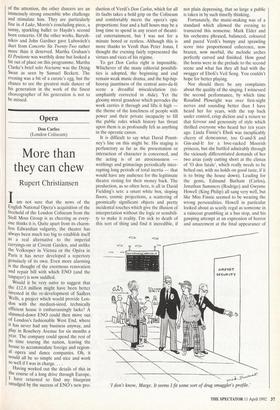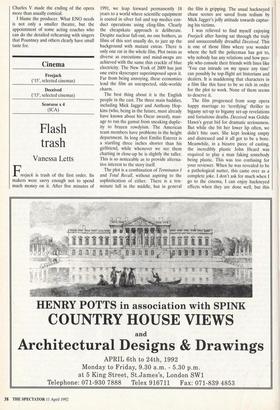Opera
Don Carlos (London Coliseum)
More than they can chew
Rupert Christiansen
Iam not sure that the news of the English National Opera's acquisition of the freehold of the London Coliseum from the Stoll Moss Group is as cheering as every- one thinks it is. Quite apart from its charm- less Edwardian vulgarity, the theatre has always been much too big to establish itself as a real alternative to the imperial carryings-on at Covent Garden, and unlike the Volksoper in Vienna or the Opera in Paris it has never developed a repertory genuinely of its own. Even more alarming is the thought of the enormous renovation and repair bill with which ENO (and the taxpayer) is now saddled.
Would it be very naïve to suggest that the 112.8 million might have been better Invested in the re-development of Sadlers Wells, a project which would provide Lon- don with the medium-sized, technically efficient house it embarrassingly lacks? A slimmed-down ENO could then move out of London's fashionable West End, where It has never had any business anyway, and play in Rosebery Avenue for six months a Year. The company could spend the rest of its time touring the nation, leaving the house to accommodate foreign and region- al opera and dance companies. Oh, it would all be so simple and nice and work SO well if I was in charge. .. .
Having worked out the details of this in the course of a long drive through Europe, I have returned to find my blueprint smudged by the success of ENO's new pro- duction of Verdi's Don Carlos, which for all its faults takes a bold grip on the Coliseum and comfortably meets the opera's epic proportions: four and a half hours may be a long time to spend in any resort of theatri- cal entertainment, but I was not for a minute bored or restless. Although this is more thanks to Verdi than Peter Jonas, I thought the evening fairly represented the virtues and vices of his regime.
To get Don Carlos right is impossible. Whichever of the many editorial possibili- ties is adopted, the beginning and end remain weak music drama, and the hip-hip- hooray jauntiness of the central auto-da-fe scene a dreadful miscalculation (tri- umphantly corrected in Aida). Yet the gloomy moral grandeur which pervades the work carries it through and lifts it high — the theme of the loneliness of people with power and their private incapacity to fill the public roles which history has thrust upon them is as profoundly felt as anything in the operatic canon.
It is difficult to say what David Pount- ney's line on this might be. His staging is perfunctory as far as the presentation or interaction of character is concerned, and the acting is of an atrociousness — writhings and grimacings periodically inter- rupting long periods of total inertia — that would have any audience for the legitimate theatre rioting for their money back. The production, as so often here, is all in David Fielding's sets: a smart white box, sloping floors, cosmic projections, a scattering of gnomically significant objects and pretty incidental touches which give the illusion of interpretation without the logic or sensibili- ty to make it reality. I'm sick to death of this sort of thing and find it incredible, if not plain depressing, that so large a public is taken in by such tinselly thinking.
Fortunately, the music-making was of a standard which allowed the evening to transcend this nonsense. Mark Elder and his orchestra phrased, balanced, coloured and paced Verdi's bumpy and sprawling score into proportioned coherence, now brazen, now morbid, the melodic arches perfectly curved and finished. How good the horns were in the prelude to the second scene and what fun they all had with the swagger of Eboli's Veil Song. You couldn't hope for better playing.
Nor should there be any complaints about the quality of the singing. I witnessed the second performance, by which time Rosalind Plowright was over first-night nerves and sounding better than I have heard her for years, with the top back under control, crisp diction and a return to that fervour and generosity of style which thrilled everyone who heard her ten years ago. Linda Finnie's Eboli was inexplicably cheery of demeanour, too G-and-S and Gin-and-It for a love-racked Moorish princess, but she battled admirably through the viciously differentiated demands of her two arias (only cutting short at the climax of '0 don fatale', which really needs to be belted out, with no holds on good taste, if it is to bring the house down). Leading for the gents, Edmund Barham (Carlos), Jonathan Summers (Rodrigo) and Gwynne Howell (King Philip) all sang very well, but like Miss Finnie seemed to be wearing the wrong personalities. Howell in particular looked about as scarily regal as someone in a raincoat grumbling at a bus stop, and his gawping attempt at an expression of horror and amazement at the final appearance of 'I don't know, Marge. It seems I fit some sort of drug smuggler's profile.' Charles V made the ending of the opera more than usually comical.
I blame the producer. What ENO needs is not only a smaller theatre, but the appointment of some acting coaches who can do the detailed rehearsing with singers that Pountney and others clearly have small taste for.



















































 Previous page
Previous page